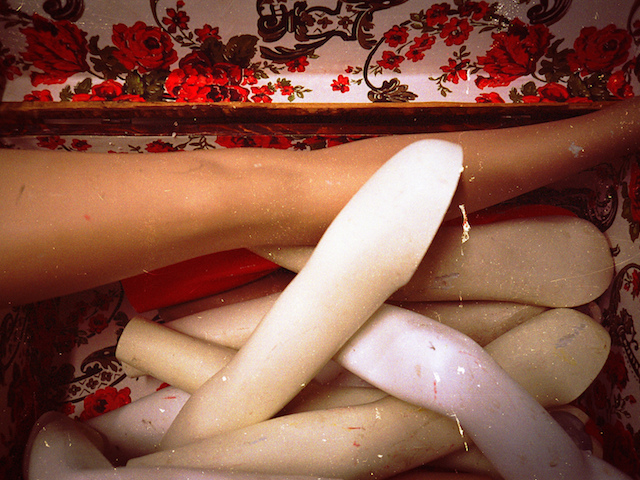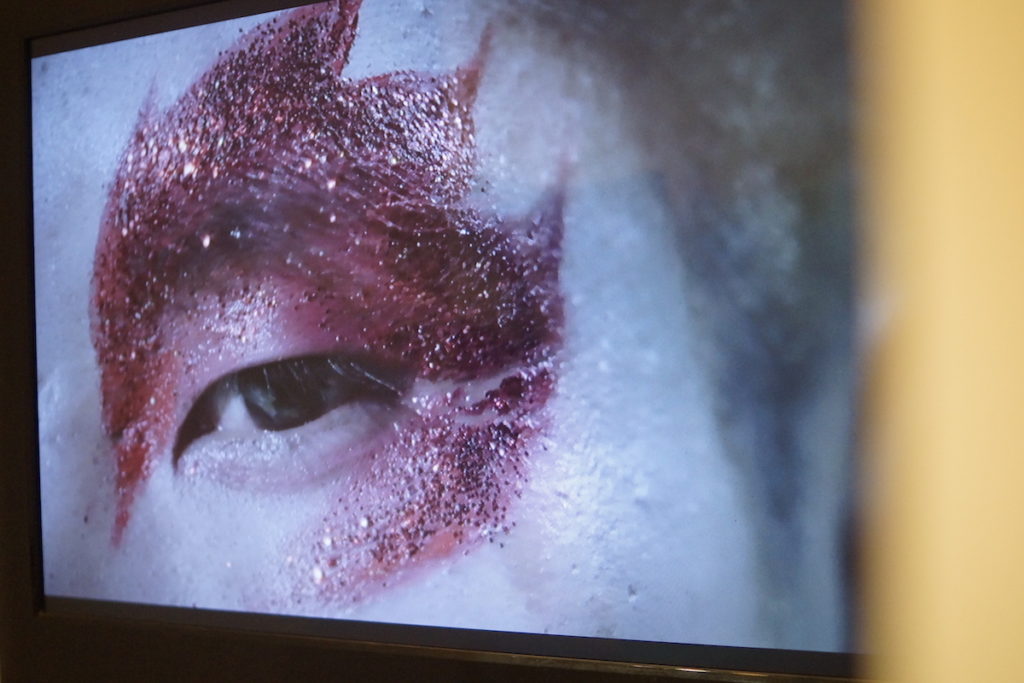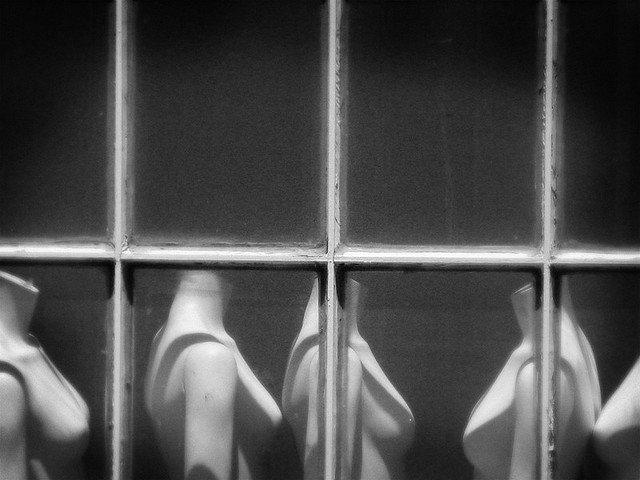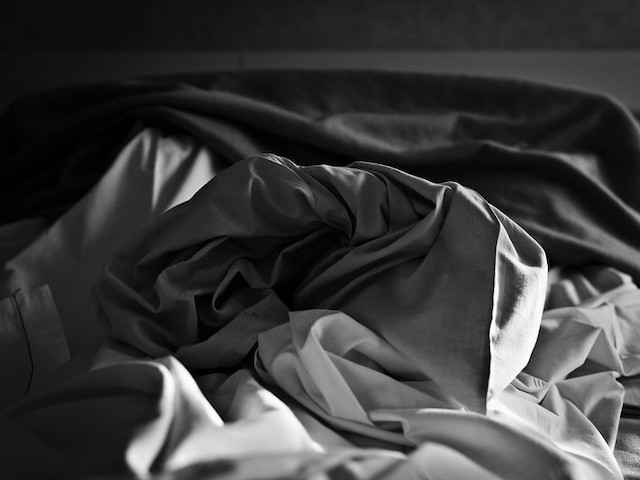“The mother, seeing her one-armed son standing in the doorway, was not surprised. It was as she had foreseen.”

March 30, 2015
Translated by Nicky Harman, “Blessed Bodies” is from Dorothy Tse’s new collection of short stories, Snow and Shadow (Muse, East Slope Publishing Limited). It is published here in collaboration with PEN America.
Y-land had no marriage system but was famous for its prosperous sex industry. Even bartering was allowed: when the male clients could not afford to pay, they could obtain sexual services by trading their body parts. At the moment of sexual arousal, a man would stand in the doorway, peeping into a dim room where a woman reclined on the bed. Once she adopted the desired position, he no longer cared about his arms or legs. But with the ebbing of arousal, the man would open his eyes to see what had once been his limb — first amputated, then frozen, bottled, and removed. Only then would he be astonished at the impulsive decision he had made.
Amputees could be seen all over Y-land, hobbling heroically along the city streets. The limbs that had once belonged to them were stored in special depots. There, glass bottles of all sizes were arrayed on rusty iron shelves in packed rows. The refracted light made the limbs, floating in preserving fluid, appear grossly deformed. Soon they would be loaded onto ships and sold to the developed countries that bordered Y-land.
At times of peak arousal, the impoverished men of Y-land milled around in the streets, gazing up at the dead leaves that floated from the trees or down at their own big feet. In the sunshine, they were accompanied by anxious shadows that crept along behind them, looming over the bodies to which they were attached.
•••
In October, the girl and her brother arrived in Y-land by boat. The streets were full of people selling creamlettes. They ladledgolden batter onto sizzling hot-plates, where it spread out and set in perfect disks that seemed to hint at a blessed life.
“You’ll lose your body here,” said her brother as he bought her a creamlette.
The cream oozed out, over the thin greaseproof paper and onto her brother’s hand—like happiness brimming over. But the fragrant smell of the creamlette just made her want to vomit.
A doctor, sitting across the rectangular white table from them, reassured her, “Being sick has nothing to do with pregnancy. You’re only feeling seasick because you’ve imagined your room as a boat.”
They took the girl and her brother up to the top floor of an old building. It was just as she had imagined it, so dark green it seemed to have moldered to the point of disintegrating.
In this gloomy apartment there were two rooms, each with gray walls and an over-sized bed. It took the girl some time to locate the tiny window, high up on the wall and pasted shut with newspaper that had yellowed with age. She stood on tiptoe on the bed, pushed the window open, and saw the mist from the street rippling towards her.
The girl really did believe from the start that this building was a boat. The first time she stepped on the floor, it felt insubstantial. The sound of waves reached her from outside the window, and the floor seeped water, so that the girl, alone with the few sticks of furniture, became frantic at the thought of going moldy.
In the middle of the night, the girl always felt terrified that the boat was spinning on the crest of a wave. The floor seemed to be bucking and rearing, and she would stagger into the other room, crawl into her brother’s bed, and sleep with him. When she woke up the next morning, she would rush to the window and look out, to reassure herself that she had not been carried off to another unknown place.
The girl liked the narrow street outside the building. Sometimes, the street was enlivened by men passing by, brandishing knives or glass jars, especially when their rich red blood dyed the asphalt and the trash heaped on it. Her eye was often caught by a bloodstained plastic bag fluttering in the breeze.
It did not take her brother long to discover that she had brought in sacks filled with stones. These she placed individually in each corner. But nothing stopped her feeling queasy, and she was forced to take the seasick pills the doctor had prescribed.
In November, the girl placed her feet side by side, joining her big toes together. It was cold, as cold as the yellow glass on the opposite side of the street. Behind the glass, she could see the face of a young man, tilted slightly upwards. The young man’s gaze was climbing right into her window. The face appeared so often that she came to regard it as part of the street scene.
•••
Her brother was surprised when she said she wanted to go outside and put up leaflets to sell herself.
She had head lice. He made her sit on a stool and he carefully separated the strands of her hair, combing out the gray-black eggs with a fine-toothed comb so that they plopped onto a metal tray. He had to crack the really stubborn ones between his fingernails before he could pull them out.
“They said you could wait six months,” said her brother, dousing her head with kerosene and wrapping it in a towel. There was a powerful stink in the air.
The girl paid no attention. She just smiled. Her face was covered in dimples, so that when she smiled, it always looked as if she was crying.
The girl told them she wanted a huge mirror so that she could see her whole body. It should be smooth and shimmering and reflect her in the minutest detail. When she washed her hair, she would sit in front of the mirror and coil it up. Then she would strip naked and look at her budding figure. She was so skinny that her bone structure was clearly visible under the skin. Under her right breast, there was one abnormally sunken rib.
“What do you think?”
Her brother was standing by her bed, looking out the window at the scenery. “Too pale, too thin.”
“How about these?” asked the girl, indicating the slight protuberances of her breasts.
“Them too.”
But the girl realized her brother was not looking at her properly so, paying no attention to what he thought, she dressed again, grabbed a sheaf of leaflets, and ran downstairs. All down the stairwell, the walls were completely covered with black leaflets, and there were more in the noodle shop at the bottom of the stairs. The people slurping their noodles and looking through the window, at a world made dark by the leaflets, thought it was the end of the world. No matter, the sorrow they felt sharpened their appetites and the hot noodlesmade them a little tipsy. The steam from their bowls obscured their coarse features and, in their excitement, men and women began to play footsie under the tables.
The young man came over to the girl. He was dressed in a baggy black sweater, and his hair was cropped short. The girl had not realized until then just how pallid he was, almost like someone in a black-and-white photograph. He tore down one of her leaflets, and a single patch of red appeared on each pale cheek. It was, thought the girl, as rich a color as the bloodied plastic bags that she had seen in the street.
•••
The mother, seeing her one-armed son standing in the doorway, was not surprised. It was as she had foreseen. The night sky was not very dark. There was a row of four streetlamps, but only one of them emitted a flickering light, and her son stood under it in his black sweater. His empty left sleeve dangled limply, showing that now he was a man. He had grown tall and slender, and looked as desolate as an empty road.
His amputation did not worry his mother. All the men in Y-land learned to do everything one-handed from boyhood, even buttoning their coats with both feet, as well as all sorts of other minor tasks. What did worry her was the way he lay in bed biting his fingernails and smiling a little smile. He just looked too blessed. It seemed that he didn’t regret the loss of an arm at all.
Silently, in a funereal mood, his mother got his dinner ready. Her son carried on lying on the bed: his head to one side, his eyes shut, day after day, in the same position. His mother was mostly puzzled by this, although sometimes the scene filled her with an almost religious fervor.
Hordes of ants began to gather at his bedside, as if on a pilgrimage. His mother took a broom and, as she swept, heaps of Coca-Cola cans clattered out from under the bed. She remembered how, years before, he used to lie in bed, obsessed by books on witchcraft. He ate nothing as he read; he just drank Coke. He kept this up for four years. After his mother washed the old Coke cans, she covered the walls of the house with them, and used them to erect a fence outside the house too. The dazzling red of the cans filled her with a near certainty that he would risk his life for his obsession.
Once when she was sure that her son was asleep, she located the ten cans in the Coke wall that she had marked and stuffed with twenty-dollar bills, and skillfully extracted them. After she checked to make sure that none of the money was missing, she hesitated for a very long time, thinking about whether to use the money to fulfill her son’s desires, but finally decided against it. Before putting the cans back in place, she took a roll of bills from one of them and put it under the seventh floorboard from the door, the one right next to the wall.
The money would be enough to give her son a decent funeral, she thought to herself.
•••
The young man was dreaming of a vast ocean.? At first it was not an ocean, but a huge bed. The naked girl was at one end of the bed, sitting cross-legged. Above her knees, he could see a pair of flat breasts that looked like oversized eyes. But the eyes were not looking at him. They gazed at a boat far, far in the distance.
The girl told him that before he came along, she often felt she was being bowled over and over in the sea, all alone, being blown by the wind to a place she did not recognize. So every time she got out of bed, she thought she had landed on a strange, new shore.
“After you came along, I felt that we were trying madly to reach the shore together, but just as we were almost there, you would turn and leave me.”
The girl’s words hurt the young man. He began to weep, his tears salty like seawater. His sorrow turned blue and shrouded the whole dream. This persuaded him that the ocean was huge.
When the young man woke up, he told his dream to a man in a black jacket who happened to be passing by outside the front door. “This must be what they call love, mustn’t it?” the man responded in a low voice.
He did not know the man, but he ended up inviting him into the house. As a result, the man became his mother’s client, and so lost an eye.
•••
The girl had few visitors, and those that did come hardly ever came back for another visit. The girl had nothing to do. She stood on the bed with her brother, looking out the tiny window into the narrow alley outside. Occasionally there were passersby, and the girl made her brother guess whether they would come upstairs.
By now the weather was getting warmer; people were wearing clothes that were too tight and made them puff and pant. Two men stood down below, looking up at the girl’s window. They stood there a long time.
“They won’t come,” her brother said, as he always did.
The girl was indignant. She stuck her head out of the window and waved energetically, but the men below lowered their heads and hurried away.
Her brother could not help smiling.
He had not told the girl how he detested her shutting the apartment door and making him wait outside. When that happened, he fidgeted anxiously, then got out his pen and wrote random hieroglyphics all over the gray wall. On and on he wrote, until his hand and arm ached.
When the visitor finally left, the girl liked to go up to the wall, connect the hieroglyphics, and make them into a song. She would sing out hoarsely: hua-hua-you-dad-tu-tu…la-la… sha-bu-dong-me-he-ya…
She made the tune sound quite festive, and could keep it up until evening. Her brother particularly disliked having visitors in the evening because, if no one came, the girl would put her arms around his neck, bury her head in his armpit, and fall fast asleep. When she woke up again, she would tell him all the dreams she’d had.
Just at that moment, someone else came into view down in the street. It was the young man, now one-eyed, walking with the aid of a stick, tapping his way along with a cheerful rhythm. Of all the visitors, her brother disliked the young man most, because when he and the girl shut the door on him it always felt like a century before they opened it up again.
Y-land folk all knew that the young man had already lost an arm and a leg and an eye for the girl. “You should hang onto your hand,” the girl told him, “to stroke my face, my thigh, and my ribs… What else can you give them?”
“It’s my liver this time,” said the young man, with a slight smile, his pale face flushing once more.
The girl was reassured and smiled. Everyone said that when the girl smiled, it always looked as if she was crying.
•••
The girl dreamed she was sitting in a boat, sailing to a small island. But it was too dark on the island, and the girl could not be sure that was what it was.
Then she saw a light, perhaps from a streetlamp in the center of the island. She felt her way towards the source of the light, only to find that it was not a streetlamp but the young man standing there. By now he had lost both arms, and was left with just one leg to hold his body upright. It was his right eye that was emitting the light. She had not realized it was so bright. It was a pity that the eye was so high up; she could not reach it, even on tiptoe. Otherwise, she could have dug it out and patrolled the island, holding it in her cupped hands. The young man’s remaining leg had sunk deep in the ground by now and the girl sat down, leaning against his leg, until the light disappeared.
When she woke up, she told the dream to her brother. He said nothing, just gently wiped the sweat from her body. His hand slid from her flat chest, down over the sunken rib. Then it stopped, and he kissed her.
•••
A light spread out in all directions, and it was possible to make out things that were represented by a variety of colors. The pink seemed to be dust, the green was mold, the violet was a puff of hypnotic powder, and the yellow was aged light. Finally, everything faded from view.
Such was the scene the young man saw before he lost his second eye. When everything had gone pitch-black, and the blackness had no trace of color left in it, he discovered he was in terrible pain. He begged to be taken home. After all, he was an old customer.
They told him they were putting him into a wooden cart, but it felt to him like he was being tossed head over heels like a fish in a huge frying pan, until every one of his still-unhealed wounds burst open. He could not tell whether what he was feeling was scorching heat or pain.
They laughed at him. “That’s because Y-land’s roads are full of potholes,” they said, “and have wrecked cars, dead fish, and bottles of lubricating oil piled up on them.”
As they went along, they took turns describing the scenery to the young man so he could tell them the way. There was an abortion clinic on the corner, they said, the one run by the woman doctor, Dr. Tang, with the gleaming white skin and great fat fingers. There was a stall selling placenta next door to the clinic, but most of the placenta was fake, just something made from gelatin. He said he did not remember the clinic or the shop. He probably had not come this way before.
“Then you can’t have been inside Y-land’s first cinema, right? They show all sorts of porn films there.”
This made them all feel sorry for the newly blind young man. By this time, they had given up asking him how to get back to his home, and were just taking him wherever they felt like, singing at the top of their voices: hua-hua-you-dad-tu-tu…la- la…sha-bu-dong-me-he-ya…
Meanwhile, the young man’s mother had gotten his dinner ready and had been sitting waiting for him for a long time. Her eyelids felt so heavy, and even though she heard the distant sound of singing, her head dropped on the table and she fell fast asleep.
The young man did not know what time it was—probably morning, to judge by the slight warmth of the sun that fell on his face. Now he had a new way to experience the sun.
“It’s so dark,” he said.
•••
The girl did not know if the young man ever visited again, because soon afterwards, she left Y-land.
On her brother’s bed, she discovered a wad of cash. “They want you to get rid of the child,” said her brother.
But his mouth was full of toothpaste and the girl could not understand what he was saying.
When he finished brushing his teeth and went back into the room to find her, the girl was gone, wandering aimlessly and alone through the dawn streets. On the pavement, there was a one-eyed old man making stuffed creamlettes with golden-yellow cream, too much of it. The girl bought one. It was the first time she had tasted one of these golden creamlettes. Its sweetness startled her, as did the fact that she liked it very much.
The street cleaner was washing down the pavement with detergent. The girl sat on a bench, nibbling carefully at the creamlette until it was all gone. By the time she had finished, bubbles were rising up from the street into the air, sailing towards some nearby railings in the morning sunlight, and then bursting, perhaps because the sun was too bright. Beyond the railings, countless silent boats were moored.
The girl finally bought herself a boat ticket to an unknown destination. When she stepped on deck, it felt curiously stable. She would not have known they were moving but for the ship’s horn. After she got pregnant, she did not vomit anymore. Her body felt heavier and heavier, and even standing on deck she did not feel like she was floating.
It was night and the boat passengers had gone to sleep. The girl discovered the cabin was full of doors, all with bolts. She tried to open them and realized they were not real bolts at all. There was nothing behind most of the doors, just an enormous hold which seemed bigger even than the entire boat. Behind one, however, was a room filled with bottles of yellow liquid. Each bottle was marked with a time and date. The largest bottles were filled with very long legs; the smallest held eyeballs. The girl crouched down and found a bottle labeled “2002-7-28 19:30,” with a small, bright eyeball in it. She picked it up and put it in her pocket. Once, she remembered, this eye had been firmly embedded in the young man’s face.
She realized that there was one woman on the boat who was not asleep. The woman’s son had died a week before. The woman had sold as many of her son’s body parts as she could, so she did not have to pay a cent for the funeral. The mother, old and faded-looking, had decided to leave Y-land after it was over. Before she left, she strung together some of the Coke cans she had stored in her son’s room and attached them to her only long skirt. Now she was on the boat, and the clanking of the cans, with their glittering red color, was her way of grieving for her son.



